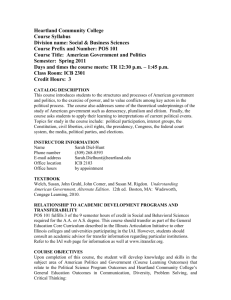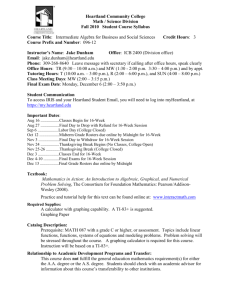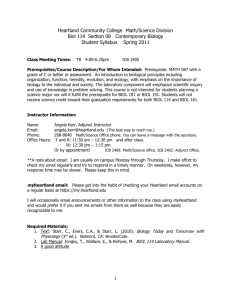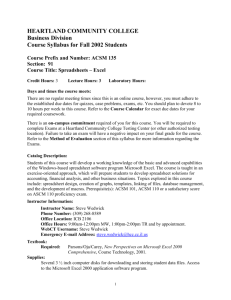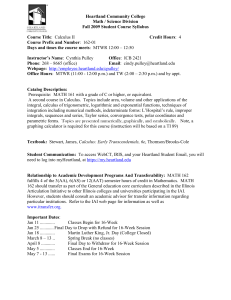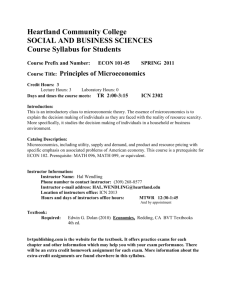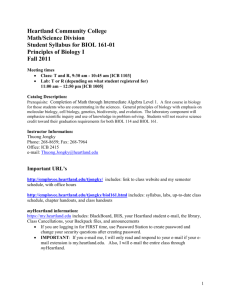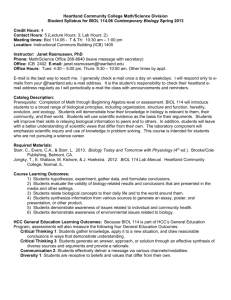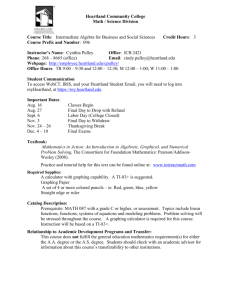HUMA 250 03 MIGOTSKY FA13
advertisement
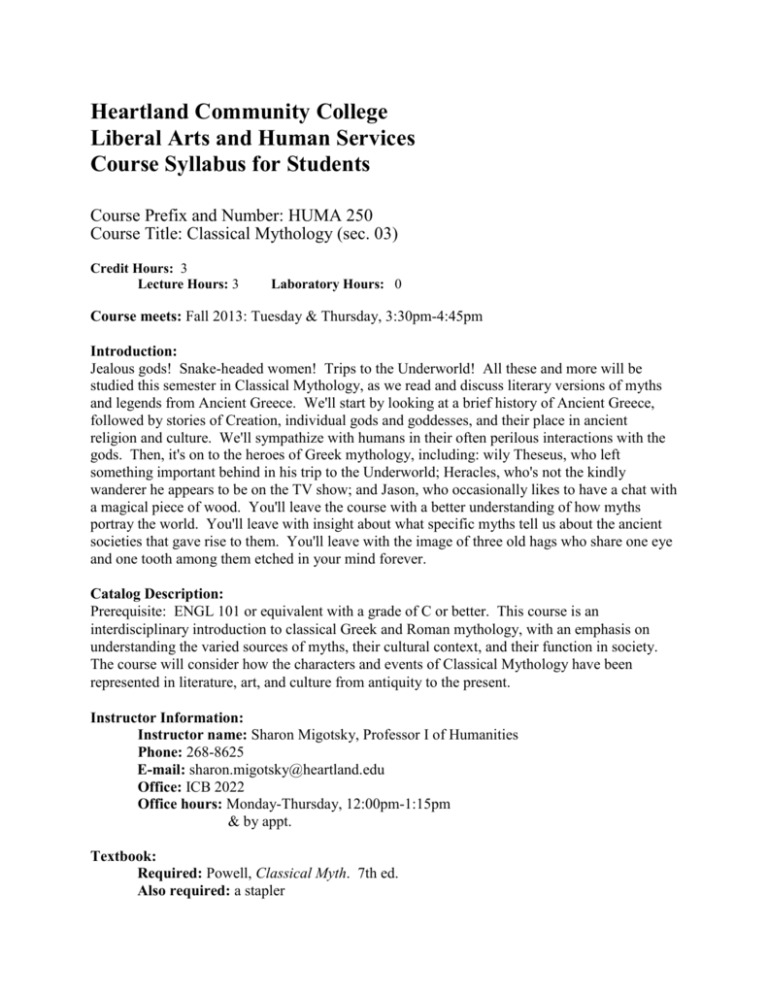
Heartland Community College Liberal Arts and Human Services Course Syllabus for Students Course Prefix and Number: HUMA 250 Course Title: Classical Mythology (sec. 03) Credit Hours: 3 Lecture Hours: 3 Laboratory Hours: 0 Course meets: Fall 2013: Tuesday & Thursday, 3:30pm-4:45pm Introduction: Jealous gods! Snake-headed women! Trips to the Underworld! All these and more will be studied this semester in Classical Mythology, as we read and discuss literary versions of myths and legends from Ancient Greece. We'll start by looking at a brief history of Ancient Greece, followed by stories of Creation, individual gods and goddesses, and their place in ancient religion and culture. We'll sympathize with humans in their often perilous interactions with the gods. Then, it's on to the heroes of Greek mythology, including: wily Theseus, who left something important behind in his trip to the Underworld; Heracles, who's not the kindly wanderer he appears to be on the TV show; and Jason, who occasionally likes to have a chat with a magical piece of wood. You'll leave the course with a better understanding of how myths portray the world. You'll leave with insight about what specific myths tell us about the ancient societies that gave rise to them. You'll leave with the image of three old hags who share one eye and one tooth among them etched in your mind forever. Catalog Description: Prerequisite: ENGL 101 or equivalent with a grade of C or better. This course is an interdisciplinary introduction to classical Greek and Roman mythology, with an emphasis on understanding the varied sources of myths, their cultural context, and their function in society. The course will consider how the characters and events of Classical Mythology have been represented in literature, art, and culture from antiquity to the present. Instructor Information: Instructor name: Sharon Migotsky, Professor I of Humanities Phone: 268-8625 E-mail: sharon.migotsky@heartland.edu Office: ICB 2022 Office hours: Monday-Thursday, 12:00pm-1:15pm & by appt. Textbook: Required: Powell, Classical Myth. 7th ed. Also required: a stapler Relationship to Academic Development Programs and Transfer: HUMA 250 fulfills 3 of the 9 semester hours of credit in Humanities/Fine Arts required for the A.A. or A.S. degree. It satisfies the Humanities component of this requirement. HUMA 250 should transfer to other Illinois colleges and universities as the equivalent of the General Education Core Curriculum course H9 901, described in the Illinois Articulation Initiative. However, students should consult an academic advisor for transfer information regarding particular institutions. Refer to the IAI web page for information as well at www.itransfer.org. Course Objectives: Course Outcomes General Education Outcomes Identify ancient Greek and Roman deities and heroes, CT1 their attributes, deeds, rituals, and historical context. Recognize and appreciate some of the major artists and artistic works that have employed mythological themes and subjects. Understand and discuss the context, development, and function of mythology and its role as cultural artifact. Understand and articulate the major themes and ideas of Classical mythology which shaped the foundations of ancient thought and the thinking and institutions of the contemporary world. CO3 PS1 DI4 Range of Assessment Methods Exams, quizzes, in-class activities, group projects, oral presentations, in- and out- of-class writing assignments Exams, quizzes, in-class activities, group projects, oral presentations, in- and out- of-class writing assignments Exams, quizzes, in-class activities, group projects, oral presentations, in- and out- of-class writing assignments Exams, quizzes, in-class activities, group projects, oral presentations, in- and out- of-class writing assignments Course Outline: Definition, Characteristics, and Types of Myth Social, Cultural, and Historical Context of Classical Mythology Social Implications and Function of Myth Theories of Myth Interpretation, Transmission, and Translation Myths of Creation & Decline Gods & Goddesses Death and the Underworld Heroic Motifs Legends & Heroes Classical Mythology in Art Myth in the Modern World Methods of Instruction: The class will be a combination of lectures, discussions, group work, and audio and visual materials, all of which students will be responsible for on exams and written work. Course Policies: Method of Evaluation: Your grade will be a compilation of scores of exams, in-class activities, and in-class and outof-class writing assignments. Grading Policy: Activity Attendance/Participation Exams Writing and Activities Group Project Total Value 3 pts. each class period 3 exams; 100 pts. each Will vary 1 project and presentation Total 100 pts. 300 pts. 150 pts. 200 pts. 750 pts. Final grades will be determined according to the following scale: 92%-100% (690-750 pts.): A 83%-91% (622-689 pts.): B 74%-82% (555-621 pts.): C 65%-73% (487-554 pts.): D Below 65% (below 487 pts.): F Participation/Attendance: You must attend class or suffer the wrath of Zeus—it’s as simple as that. Students will earn participation points for each class period, for a maximum of 3 pts. each class period (6 pts. per week). Late arrivals, early exits, texting/sleeping in class, and other factors which inhibit full participation will adjust the points earned accordingly. Students with excessive absences (defined as more than 6 total absences for the semester) are subject to failing or being withdrawn from the course. Each student is responsible for signing the attendance sheet at the beginning of each class period; if you are late to class, be sure to sign in as a late arrival before leaving class for the day. You must sign the attendance sheet to be counted as present. I do not want to be drawn into a position of judging which excuses are “worthy,” and which are not. Car trouble, alarms that fail to ring, bad weather, colds and flu, work responsibilities, personal circumstances, etc. are facts of everyday life—not excused absences. Make-up of tests and assignments: Exams, written work, and out-of-class assignments can be made-up only in the case of a documented hospitalization, jury or military duty, or school-sponsored activity, and must be made-up within one week. I will not read work that is late because of unexcused absences; make-up quizzes will be given only in the case of absences due to the above circumstances. Activities that we do in class can’t be made up—if you’re not there, you can’t participate. Absences also place an unfair burden on other students during group work. If you have missed due to the above documented circumstances, then there may be an optional assignment—for partial credit, and due within one week—available. All assignments are due at the beginning of class on the assigned dates. It is the students’ responsibility to come to class on time; assignments will not be accepted after the beginning of class, and assignments due to tardiness may not be made up. If you must miss a class, send any assignments that are due with someone else so that your work is not late. If you missed a class, call someone to find out what you need to prepare for the next class session. While I’m always happy to explain what you missed in any class period, don’t count on me as your sole resource for the class. I may not get your e-mail or phone message in time to explain things before the next class period, so always have another source to turn to. Incompletes: An incomplete grade may be given to a student who, by the withdrawal date, can reasonably be expected to pass the course; 80% of the course and coursework must have been completed by that point in order for an Incomplete to be possible. "Incompletes" may be granted only when justified by extreme and documented circumstances (e.g., serious illness, accident, death or serious illness in the immediate family). Incomplete grades are not given for such reasons as unjustified failure to appear for the final examination. A written agreement, outlining the requirements to be met, must be signed by the instructor and the student. The agreed upon requirements must be completed no later than the end of the following semester (spring semester for "Incompletes" granted during the fall, and the following fall for incompletes given during the spring and summer semesters). By the agreed upon date, the instructor will assign a grade or the incomplete will be changed to an "F" if the requirements are not completed. Note: Course policies are in place to ensure that everyone is treated fairly. Please do not ask me to violate the terms of the syllabus. Required Writing and Reading: Written responses and other assignments (in-class and out-of-class) discussing particular myths, themes, and social, cultural, and historical issues. Exams will contain essay questions. Written work must be typed or keyed into a computer, and must meet the required page length. The writing is expected to be free from errors in spelling and basic punctuation and grammar. Wikipedia (and similar online publicly authored databases) are not acceptable sources for researching class assignments. Required reading will include assigned texts, materials on library reserve, and handouts from the instructor. Other Course Policies: Please do not disrupt the class, the instructor, or the other students. --All cell phones, beepers, etc., must be turned off during class. This means that there is no texting during class. Period. --Student services asks that students do not bring children of any age to class. --HCC asks that students use their Heartland gmail account when contacting instructors. I strive to answer all e-mails in a timely fashion; usually this means within 24 hours during the business week. Notice of Canceled Class Sessions Cancelled class sessions, for all HCC classes, will be listed under Cancelled Class Meetings in the A-Z Index and under Academic Information in the Current Students page on the HCC Web site. Go to http://www.heartland.edu/classCancellations/ to learn what classes have been cancelled for that day and the upcoming week. Be sure to check the last column, which might contain a message from the instructor. Academic Integrity and Plagiarism Academic Integrity Academic integrity is a fundamental principle of collegial life at Heartland Community College and is essential to the credibility of the College’s educational programs. Moreover, because grading may be competitive, students who misrepresent their academic work violate the right of their fellow students. The College, therefore, views any act of academic dishonest as a serious offense requiring disciplinary measures, including course failure, suspension, and even expulsion from the College. In addition, an act of academic dishonesty may have unforeseen effects far beyond any officially imposed penalties. Violations of academic integrity include, but are not limited to cheating, aiding or suborning cheating or other acts of academic dishonesty, plagiarism, misrepresentation of data, falsification of academic records or documents and unauthorized access to computerized academic or administrative records or systems. Definitions of these violations may be found in the college catalog. Plagiarism Plagiarism is the presenting of others’ ideas as if they were your own. When you write a paper, create a project, do a presentation or create anything original, it is assumed that all the work, except for that which is attributed to another author or creator, is your own. Plagiarism is considered a serious academic offense and may take the following forms: 1 Copying word-for-word from another source and not giving that source credit. 2 Paraphrasing the work of another and not giving that source credit. 3 Adopting a particularly apt phrase as your own. 4 Using an image or a copy of an image without crediting its source. 5 Paraphrasing someone else’s line of thinking in the development of a topic as if it were your own. 6 Receiving excessive help from a friend or elsewhere, or using another project as if it were your own. Note that word-for-word copying is not the only form of plagiarism. Plagiarism will result in immediate failure of the course, as well as possible further sanctions at the college level. [Adapted from the Modem Language Association’s MLA Handbook for Writers of Research Papers. New York: MLA, 1995: 26] Support Services: Heartland Library Information http://www.heartand.edu/library The Library, located within the Academic Support Center (ASC) on the Normal campus, provides Heartland students with a variety of on-campus resources that support both class work and personal inquiry. These include: reference tools (print and non-print), periodicals, audiovisual materials and equipment, reserves, a general circulating collection, and a fiction collection. Computer terminals provide access to various electronic resources, including Academic Universe, FirstSearch, and EbscoHost databases; CARL online card catalog, and Internet access. Several electronic resources are accessible from computers off campus. Students may borrow books from the fiction and general collections and may renew materials, in person or by phone, if requests have not been placed on them. Heartland students also have Interlibrary Loan privileges from Heartland Library. Items usually take 1 to 3 weeks from date of the order to arrive. The Library maintains a quiet study environment. Assistance is available for all library and information needs. Heartland Library is open Monday-Thursday 7:30 a.m. to 9:30 p.m., Friday 7:30 a.m. to 4 p.m., when the college is in session, but is closed on holidays that Heartland observes. Intersession and summer hours are reduced. Milner Library at Illinois State University is a public institution so you may use their collection on site. If you want to request to check out materials, ask for a free Community Borrowers card application at the Milner Library circulation desk. It is important that you have specific titles to request for check out when you apply for the card. The card will give you access to their circulating collection for three months, with a four week check out period. To qualify for this service you must live within 50 miles of Milner, have a current state ID (driver's license) with current address on ID, and be over age 18. After you fill out the application Milner will perform a background check on you for over due books, etc. For more information about Library services please call the Library at 268-8200. Tutoring and Academic Support http://www.heartland.edu/tutoring Heartland Community College offers learning assistance in various forms at no cost to Heartland students at the Academic Support Center (ASC) in Normal and at the Pontiac and Lincoln Centers. Tutors are available at convenient times throughout the week. Study groups, group tutoring facilitated by a specially-trained tutor, are also available by request. Help is also provided through instructional materials, study skills workshops, open computing, and the Library. For more information about services available at each location, please call the ASC in Normal at (309) 268-8235, the Pontiac Center (815) 842-6777; or the Lincoln Center (217) 7351731. If you have a documented disability and wish to discuss academic accommodations, please contact Anita Moore at 268-8249 or anita.moore@heartland.edu. Academic Support Services (Academic Support Center) Lab Testing Center Lab http://www.heartland.edu/testing The Testing Center proctors make-up exams for students enrolled in traditional courses. In addition, regularly scheduled exams for alternative delivery courses are also proctored at this Center. Exams are proctored free of charge in a secure and quite environment. For more information about exam proctoring services contact the Testing Center at (309) 268-8231. Open Computing Lab http://www.heartland.edu/computerlab The Open Computing Lab provides free computing for HCC students at convenient times throughout the week. The computer lab is staffed by trained Lab Assistants and offers the use of approximately 70 computers, a scanner, a laser printer, and an electric typewriter. Syllabi disclaimer: I reserve the right to change the terms if the syllabus if deemed necessary. COURSE CALENDAR: (Note: Readings are due on the date listed) August 20: August 22: Topic: Introduction to Course/Background on Myth Topic: Discussion of Myth Reading: Chapters 1 & 2 August 27: August 29: Topic: Problems of Translation Reading: Chapter 3 Topic: History/The City-States September 3: September 5: Topic: History/The City-States Topic: History/The City-States September 10: September 12: Topic: Transmission of Myth/Social & Cultural Contexts Topic: Creation Myths Reading: Chapter 4 September 17: Topic: Gods & Goddesses Reading: Chapters 6-11 Topic: Gods & Goddesses September 19: September 24: September 26: October 1: October 3: October 8: October 10: Topic: Human Creation & Decline Reading: Chapter 5 Exam #1 Topic: Greek Attitudes Toward Death/Oedipus Reading: Chapter 12 Reading: pgs. 483-491 Topic: Greek Attitudes Toward Death/Heroes & the Hero Motif Topic: Perseus Reading: Chapter 14 Topic: Perseus October 15: October 17: Topic: Perseus Topic: Heracles Reading: Chapter 15 October 22: October 24: Topic: Heracles Topic: Heracles October 29: October 31: Exam #2 Topic: Theseus & Minos Reading: Chapters 16 & 17 November 5: November 7: Topic: Theseus & Minos Topic: To Be Announced November 12: Topic: The Origin of the Trojan War/Odysseus Reading: Chapters 20, 21, &22 Topic: Odysseus November 14: November 19: November 21: Topic: Odysseus Topic: Jason & the Argonauts Reading: Chapter 19 November 26: November 28: Topic: Jason & the Argonauts Thanksgiving Break: No Class December 3: December 5: Exam #3 Topic: To Be Announced December 12: Final Exam Period, 2:00pm-3:50pm Group Projects/Presentations due
